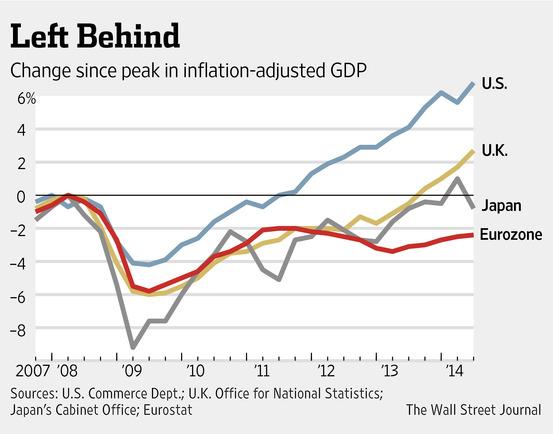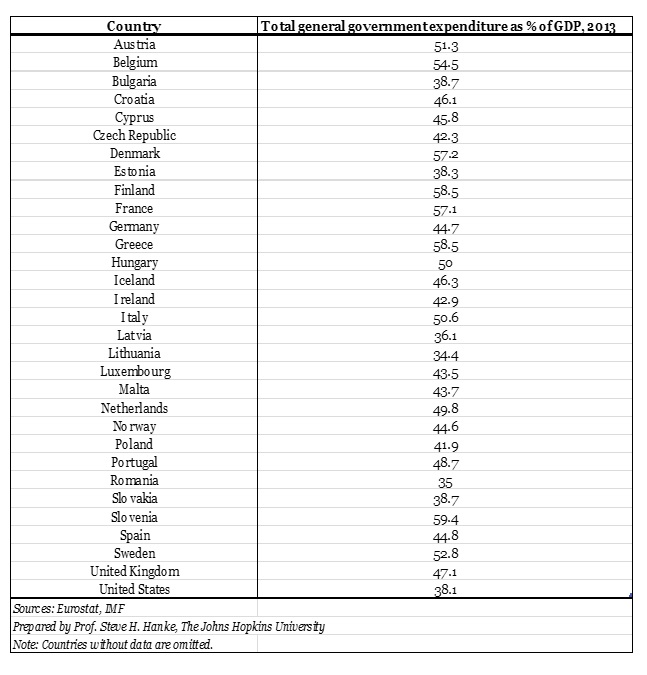Europe is in deep trouble.
That’s an oversimplification, of course, since there are a handful of nations that seem to be moving in the right direction (or at least not moving rapidly in the wrong direction).
 But notwithstanding those exceptions, Europe in general is suffering from economic stagnation caused by a bloated public sector. Barring dramatic change, another fiscal crisis is a virtual certainty.
But notwithstanding those exceptions, Europe in general is suffering from economic stagnation caused by a bloated public sector. Barring dramatic change, another fiscal crisis is a virtual certainty.
A key problem is that Europe’s politicians suffer from fiscal incontinency. They can’t resist spending other people’s money, regardless of all the evidence that excessive government spending is suffocating the productive sector of the economy.
Yet some of them cling to the discredited Keynesian notion that government spending “stimulates” economic performance. Writing for the Wall Street Journal, Brian Wesbury explains why European politicians are wrong.
We need less government, not more, and yet governments are engaged in deficit spending like they did in the 1970s. It didn’t work then to boost growth, and it isn’t working now. Euro area government spending was 49.8% of GDP in 2013 versus 46.7% in 2006. In other words, euro area governments have co-opted an additional 3.1% of GDP (roughly €300 billion) compared with before the crisis—about the size of the Austrian economy. France spent 57.1% of GDP in 2013 versus 56.7% in 2009, at the peak of the crisis. This is the opposite of austerity—but the French economy hasn’t grown in more than six months. It is no wonder S&P downgraded its debt rating. Italy, at 50.6% of GDP, is spending more than the euro area average but is contracting faster.
Brian isn’t the first person to make this observation.
Constantin Gurdgiev, Fredrik Erixon, and Leonid Bershidsky also have pointed out the ever-increasing burden of government in Europe.
Recommended
And I can’t count how many times I’ve also explained that Europe’s problem is too much government.
The problem with all this government spending, as Brian points out, is that politicians don’t allocate resources very intelligently. So the net result is that labor and capital are misallocated and we get less economic output.
Every economy can be divided into two parts: private and public sectors. The larger the slice taken by the government, the smaller the slice left over for the private sector, which means fewer jobs and a lower standard of living. If government were more productive than private business this wouldn’t be true, but government is not.
Let’s be thankful, by the way, that the United States isn’t as far down the wrong road as Europe.
And this is why America’s economy is doing better.
The U.S. is growing faster than Europe not because…our government is relatively smaller. Federal, state and local expenditures in the U.S. were 36.5% of GDP in 2013. This is too high, but because it is less than Europe, the U.S. has a larger and more vibrant private sector.
Ironically, even President Obama agrees that the U.S. economy is superior, though he (predictably) is incapable of putting 2 and 2 together and reaching the right conclusion.
My Cato colleague Steve Hanke (using the correct definition of austerity) also has weighed in on the topic of European fiscal policy.
Here’s some of what he wrote for the Huffington Post.
The leading political lights in Europe — Messrs. Hollande, Valls and Macron in France and Mr. Renzi in Italy – are raising a big stink about fiscal austerity. They don’t like it. And now Greece has jumped on the anti-austerity bandwagon. …But, with Greece’s public expenditures at 58.5 percent of GDP, and Italy’s and France’s at 50.6 percent and 57.1 percent of GDP, respectively — one can only wonder where all the austerity is (see the accompanying table). Government expenditures cut to the bone? You must be kidding.
Here’s Professor Hanke’s table. As you can see, the burden of government spending is far above growth-maximizing levels.
That’s a very depressing table, particularly when you realize that government used to be very small in Europe. Indeed, the welfare state basically didn’t exist prior to World War II.
P.S. Shifting to another issue, it’s not exactly a secret that I have little respect for politicians.
But some of our “leaders” are worse than others. Maryland’s outgoing governor is largely known for making his state inhospitable for investors, entrepreneurs, and small business owners.
Notwithstanding his miserable record, he thinks of himself as a potential presidential candidate. And one of his ideas is that wireless access to the Internet is a human right.
I’m not joking. Here’s what Charles Cooke wrote for National Review.
Maryland’s governor Martin O’Malley — a man so lacking in redeeming qualities that a majority in his own state hopes he doesn’t run for president – is attempting to carve out a new constituency: young people with no understanding of political philosophy. …“WiFi is a human right”? Hey, why not? Sure, Anglo-American societies have traditionally regarded “rights” as checks on the power of the state. But if we’re going to invert the most successful philosophy in American history to appease a few terminally stupid millennials in Starbucks, let’s think big
This definitely belongs in my great-moments-in-human-rights collection.
Here are previous winners of that booby prize.
- Academics in both America and Europe, as well as a committee from the Council of Europe, claim there is a right to other people’s money.
- Across Europe, a satellite dish is now a human right.
- The Department of Housing and Urban Development asserts there is a right to “emotional support animals” in college dorms.
- In Finland, broadband access is a basic right.
- In France, it is against the law to say your husband is under-endowed or that your wife is fat.
- There’s now an entitlement for free soccer broadcasts in Europe.
- In Italy, you have the right to…um…your testicles.
- Both the United Nations and the Obama Administration think there’s a right to taxpayer-financed birth control.
- There’s now a right, according to the federal government, to taxpayer-financed sex-change operations for the elderly.


























Join the conversation as a VIP Member